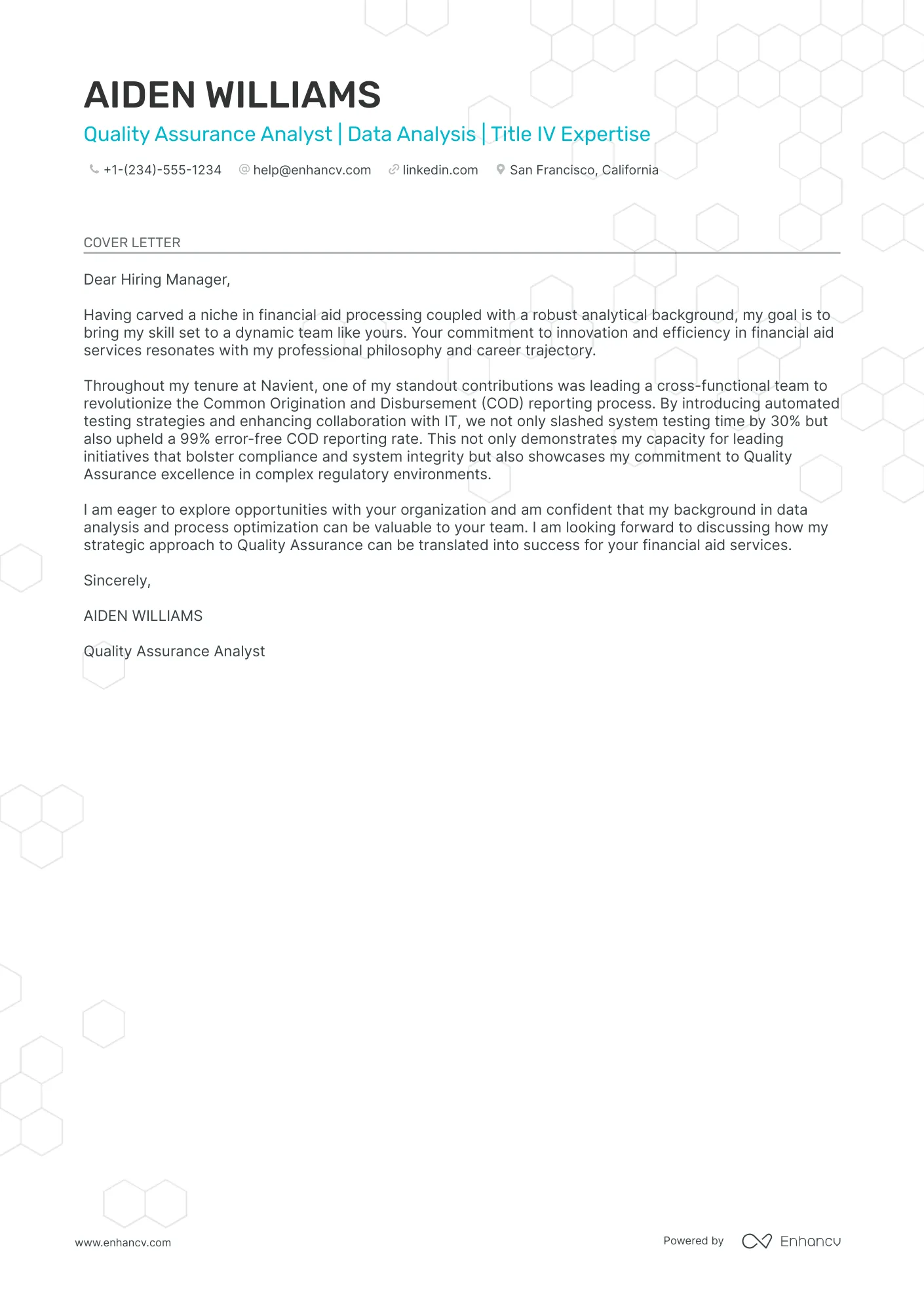QA Cover Letter Top 5 Examples
Landing a quality assurance (QA) role requires more than just a stellar resume. A well-crafted QA cover letter is your opportunity to showcase your skills, passion, and personality, setting you apart from other applicants. This guide provides five distinct cover letter examples tailored to different QA professionals, along with tips to help you create your own winning cover letter. Whether you are a beginner, an experienced professional, a career changer, a technical specialist, or an agile advocate, we’ve got you covered. Each example highlights key aspects and essential components to help you secure an interview and ultimately land your dream job. Remember, a cover letter is your first impression, make it count.
Understanding the Importance of a QA Cover Letter
A QA cover letter serves as a critical introduction to your application, providing context and personality that a resume alone cannot. It’s your chance to explain why you’re interested in the specific role and company, demonstrating your enthusiasm and alignment with their values. A well-written cover letter allows you to expand on your skills, provide detailed examples of your accomplishments, and highlight your understanding of the company’s needs. It shows that you’ve taken the time to learn about the role and are genuinely interested in contributing to the team. A strong cover letter often tips the scales in your favor, distinguishing you from other candidates and increasing your chances of getting an interview.
Why a Strong Cover Letter Matters
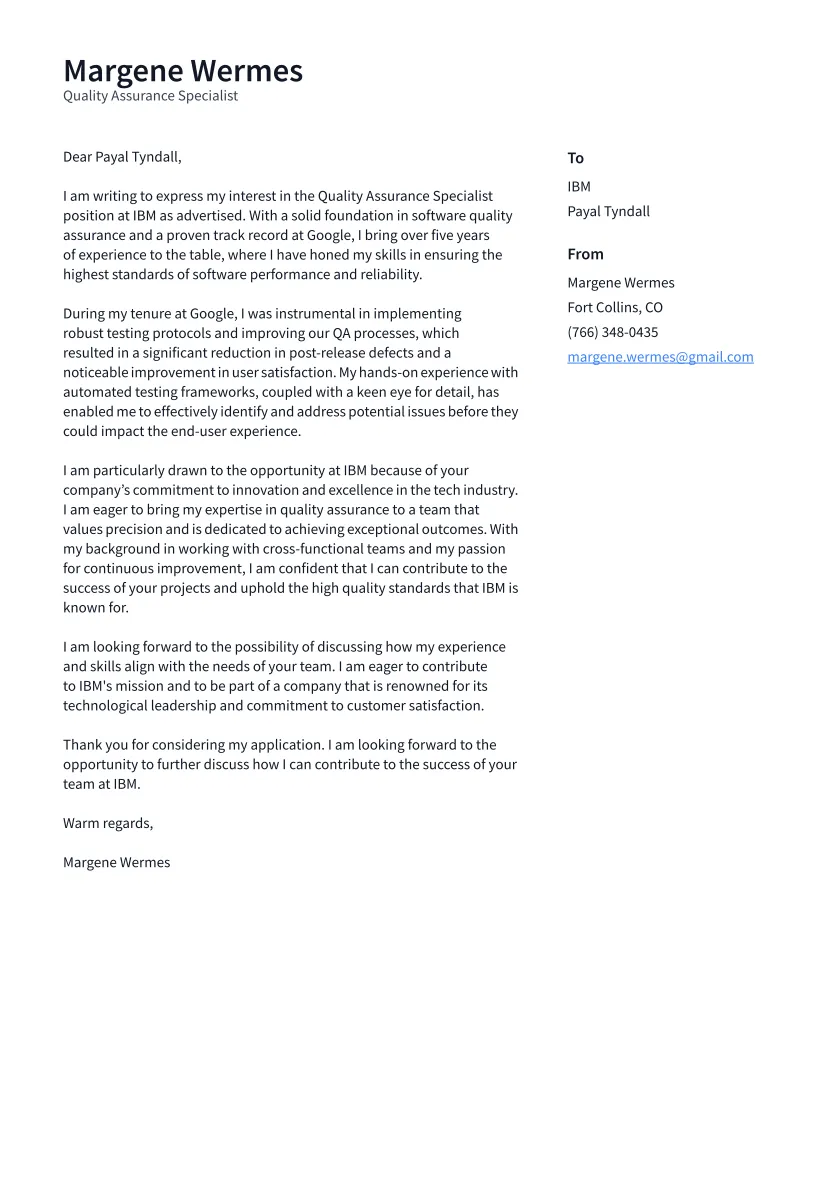
In a competitive job market, a compelling cover letter can be the difference between getting an interview and being overlooked. It allows you to personalize your application and address specific requirements mentioned in the job description. A strong cover letter enables you to showcase your soft skills, such as communication and problem-solving abilities, which are essential for a QA role. By tailoring your letter to each application, you demonstrate your attention to detail and commitment to the role. Additionally, it’s an opportunity to explain any gaps in your resume or career changes, providing a clear and concise narrative that enhances your overall application.
Key Components of an Effective QA Cover Letter
An effective QA cover letter should include several key components. Start with a professional greeting and introduce yourself, clearly stating the position you’re applying for and where you found the listing. In the body of the letter, highlight your relevant skills and experiences, providing specific examples of your accomplishments and how they align with the job requirements. Explain why you are interested in the company and the role, showcasing your knowledge and enthusiasm. Close with a call to action, expressing your eagerness for an interview and thanking the hiring manager for their time and consideration. Ensure the letter is well-formatted, error-free, and tailored to the specific job description. Using the right keywords is also critical.
Example 1 The Enthusiastic Beginner
This example is perfect for those entering the QA field with little to no experience. The goal is to emphasize transferable skills and eagerness to learn. This example focuses on highlighting academic achievements, projects, or volunteer experiences that demonstrate attention to detail, problem-solving abilities, and a passion for quality assurance. The tone should be enthusiastic and proactive, showing a willingness to quickly learn and adapt. Use this template to present yourself as a highly motivated candidate, eager to grow and contribute to the team. Tailor your cover letter to the role, showing your genuine interest in the company.
Highlighting Relevant Skills
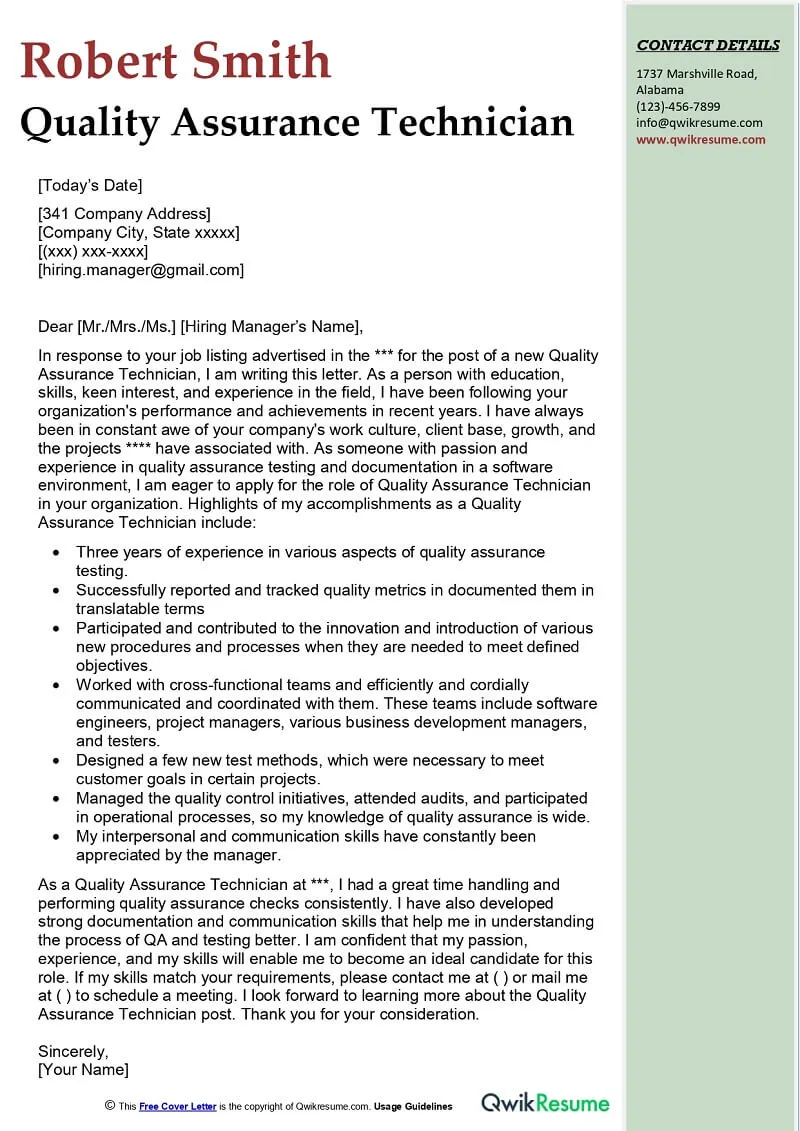
Even without direct QA experience, you likely possess skills relevant to the role. Focus on skills such as attention to detail, critical thinking, communication, and teamwork. Provide examples from your academic projects or extracurricular activities where you demonstrated these skills. For instance, if you were involved in a group project, describe your role in ensuring quality and accuracy. If you volunteered, explain how you ensured that tasks were completed correctly and efficiently. Mention any courses or certifications related to QA principles, such as software testing methodologies. The aim is to show that you have the foundational skills and aptitude to excel in QA.
Emphasizing Passion and Eagerness
Show your genuine interest in quality assurance by explaining what attracts you to the field. Mention any personal projects where you’ve applied testing principles. Express your enthusiasm for learning and growing within the company. Demonstrate your willingness to embrace new challenges and contribute to the team’s success. The cover letter should convey your proactive attitude and eagerness to quickly adapt and learn. End with a clear statement of your desire for an interview, expressing your excitement about the opportunity to discuss how you can contribute. A passionate approach is key.
Example 2 The Experienced QA Professional
For experienced QA professionals, the cover letter is an opportunity to showcase a proven track record of success. The focus is on highlighting significant achievements, results, and expertise in testing methodologies and tools. This example demonstrates quantifiable accomplishments and provides concise, clear evidence of your value. The cover letter should reflect your deep knowledge of the QA processes and your ability to provide insights and solutions. Focus on metrics that clearly show your impact on previous projects. This will highlight your ability to enhance quality and drive results.
Showcasing Achievements and Results
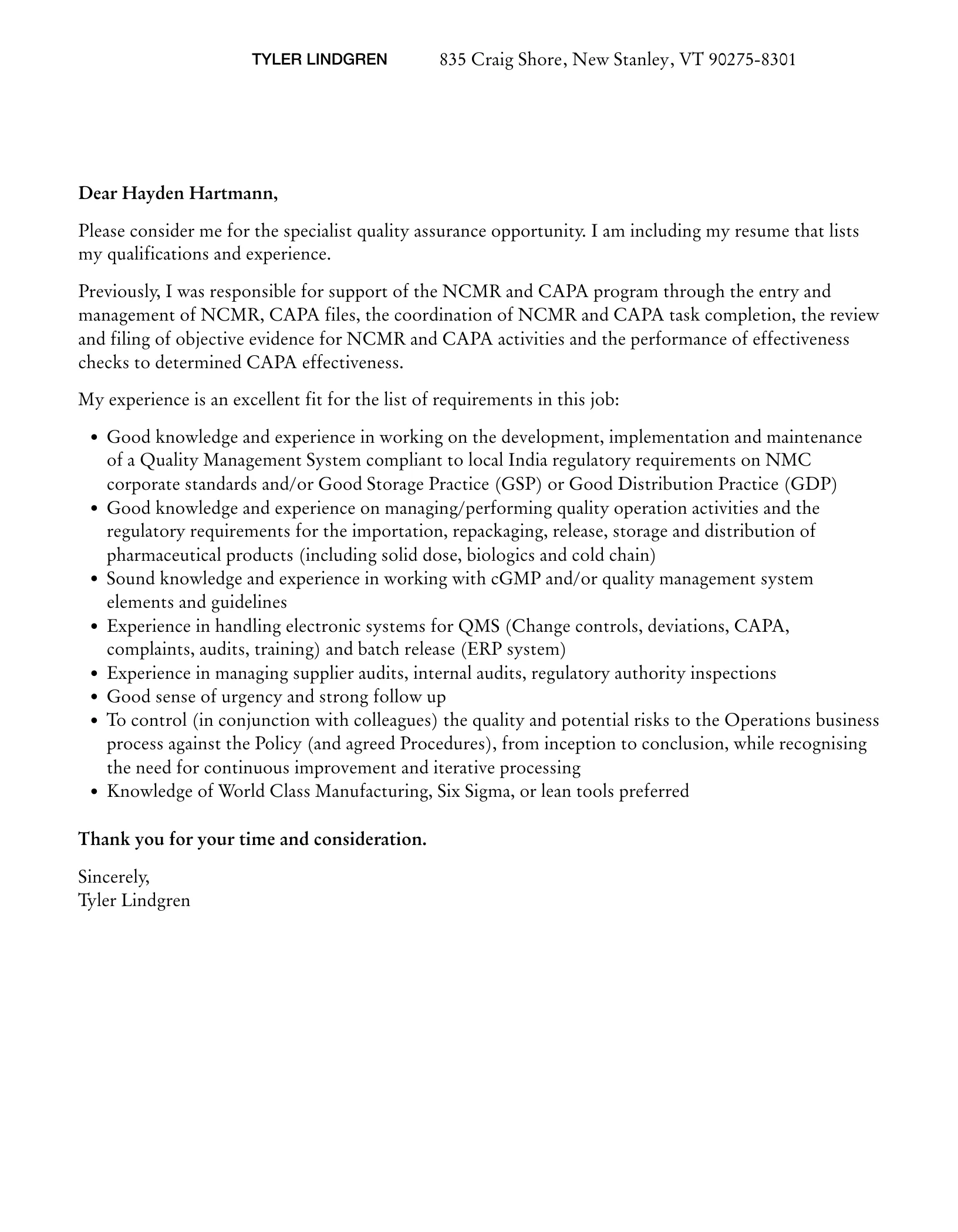
Use your cover letter to highlight key achievements from your previous roles. Focus on quantifiable results, such as the number of bugs found, the percentage reduction in defects, or improvements in test coverage. Describe any significant projects or initiatives where you played a key role. Mention any awards or recognition you received for your contributions. Ensure that your achievements align with the requirements of the job you are applying for. Providing specific examples demonstrates your ability to solve problems and deliver results. Make it easy for the hiring manager to understand your value.
Quantifying Accomplishments
Quantify your accomplishments whenever possible to provide concrete evidence of your impact. For example, instead of saying “Improved testing processes,” state “Improved testing efficiency by 20% by implementing automated testing scripts.” Use metrics to demonstrate the value you bring to the team and the company. Include statistics that highlight your contributions to projects. Focus on how your actions led to positive outcomes, such as reduced costs, improved product quality, or faster time to market. Using numbers makes your accomplishments more compelling and shows that you’re data-driven.
Example 3 The Career Changer
If you’re transitioning into QA from a different field, your cover letter needs to bridge the gap and highlight transferable skills. This example helps you to connect your previous experiences with the requirements of a QA role. The focus is on demonstrating how your previous skills, such as analytical abilities, communication, and problem-solving, can be applied to QA. The letter should showcase your ability to adapt and your passion for the new career. Include a clear and concise explanation of your decision to transition into the QA field. Show that you have researched QA and its requirements.
Transferable Skills and Adaptability
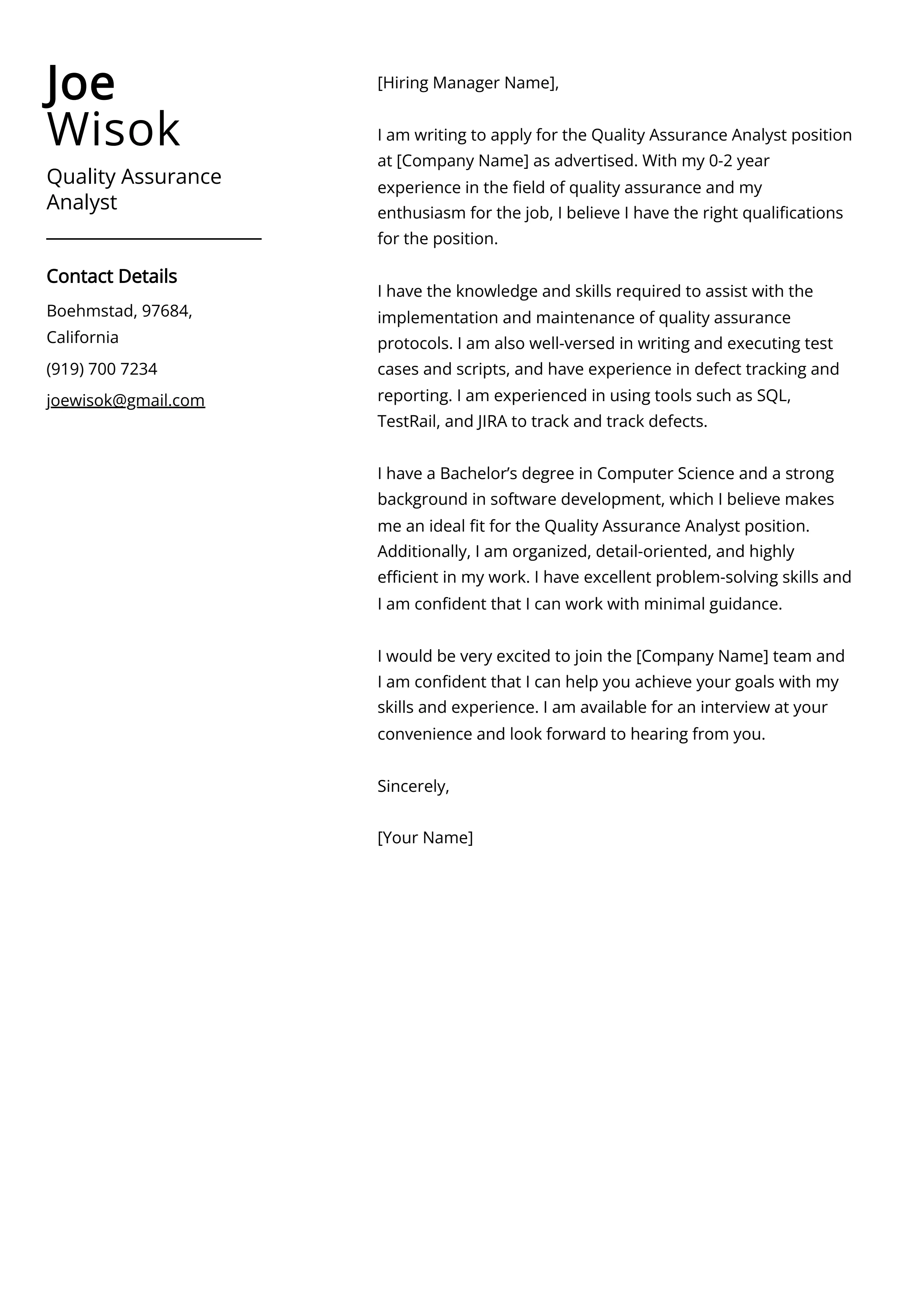
Identify transferable skills from your previous roles that are relevant to QA. For instance, if you have experience in project management, highlight your organizational skills and ability to manage deadlines. If you have a background in customer service, emphasize your ability to communicate effectively and understand user needs. Use examples to show how you applied these skills in your previous roles and how they will be valuable in QA. Highlight your adaptability, demonstrating that you are comfortable learning new technologies and methodologies. This makes the transition feel natural.
Demonstrating a Desire to Learn
Express your enthusiasm for QA and your commitment to continuous learning. Mention any courses, certifications, or self-study you have undertaken to prepare for the transition. Show your understanding of QA principles and methodologies by discussing your research on the industry. Emphasize your willingness to learn new technologies and adapt to different environments. This will reassure the hiring manager that you are serious about your career change and eager to contribute. Be honest about your experience and focus on what you can offer.
Example 4 The Technical QA Specialist
Technical QA specialists should focus on their technical proficiency in their cover letter. This example emphasizes the specific technologies, tools, and methodologies you’re experienced with. The cover letter should highlight your ability to troubleshoot complex issues, your understanding of software development processes, and your experience with automation and performance testing. Focus on how you’ve used these tools and methodologies to improve product quality. Showing technical expertise is essential in the cover letter.
Focusing on Technical Proficiency
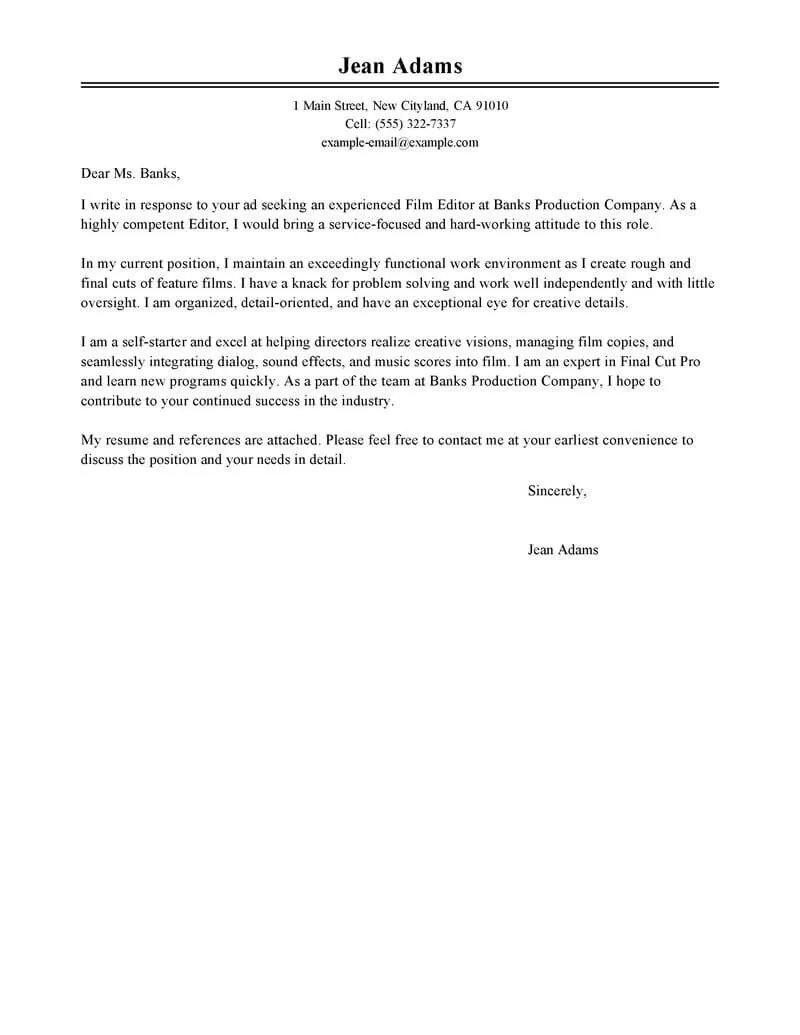
Showcase your deep knowledge of relevant technologies and tools. Mention your expertise in specific testing tools, such as Selenium, JUnit, or TestNG. Highlight your experience with different types of testing, including performance, security, and automation testing. Describe your understanding of software development methodologies, such as Agile or Waterfall. Show how you have used your technical skills to improve testing processes and identify defects. Your technical proficiency is the most important aspect of the cover letter.
Detailing Experience with Tools and Technologies
Provide detailed examples of your experience with the tools and technologies mentioned in the job description. Describe your experience with automation frameworks, scripting languages, and bug tracking systems. Quantify your accomplishments by providing specific metrics, such as the number of automated tests you created or the percentage of defects you identified. Explain how you used these tools to improve the efficiency and effectiveness of testing processes. It is a demonstration of how you utilized your knowledge and abilities to improve product quality. Being specific is very important.
Example 5 The Agile QA Advocate
If you have experience in Agile environments, your cover letter should emphasize your understanding of Agile principles and your ability to work collaboratively. This example should highlight your experience with Agile methodologies, your ability to work in cross-functional teams, and your communication skills. Describe how you’ve contributed to the success of Agile projects, and emphasize your ability to adapt to changing requirements and priorities. Make certain that the cover letter conveys that you have a passion for Agile methodologies. Explain how you’ve driven improvements in Agile teams.
Highlighting Agile Methodologies
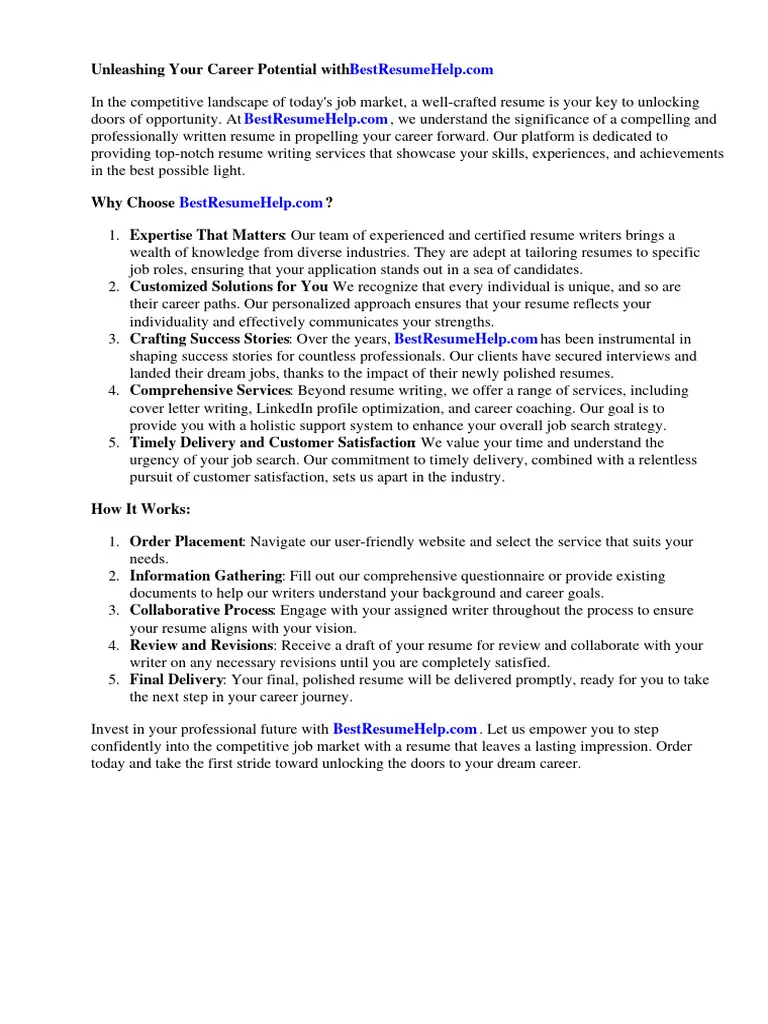
Demonstrate your understanding of Agile principles and your experience with Agile methodologies. Mention your experience with Scrum, Kanban, or other Agile frameworks. Describe how you’ve participated in Agile ceremonies, such as daily stand-ups, sprint planning, and retrospectives. Provide examples of how you’ve contributed to the success of Agile projects, and highlight your ability to adapt to changing requirements. Focus on your flexibility and your willingness to embrace change. Display your passion for Agile and your desire to contribute to collaborative team environments.
Emphasizing Teamwork and Collaboration
Highlight your ability to work collaboratively in cross-functional teams. Describe your experience working with developers, product owners, and other stakeholders to achieve project goals. Emphasize your communication skills and your ability to facilitate effective collaboration. Provide examples of how you’ve contributed to team success, such as resolving conflicts or improving communication. Display how you support teamwork. Highlight how you approach teamwork. Agile success depends on collaboration, so demonstrate that you are a team player.
Tips for Tailoring Your QA Cover Letter
To maximize the impact of your QA cover letter, it’s essential to tailor it to each job application. This section provides practical tips to guide you in creating a compelling cover letter that aligns with the specific requirements of each role and company. By researching the company, using relevant keywords, and proofreading your letter carefully, you can significantly increase your chances of securing an interview and advancing your career.
Researching the Company and Role
Before submitting your cover letter, conduct thorough research on the company and the specific role. Understand the company’s mission, values, and recent projects. Visit their website, read their blog, and check out their social media pages. Look for information about their products, services, and target audience. Tailor your cover letter to address the company’s specific needs and challenges. Align your skills and experience with the requirements of the role. The more you show that you understand the company and its needs, the better your chance of being hired.
Using Keywords from the Job Description
Carefully review the job description and identify the keywords and phrases used by the hiring manager. Incorporate these keywords into your cover letter in a natural and relevant way. This helps your application pass through applicant tracking systems (ATS) and ensures that your skills and experience are easily recognized. Use the keywords throughout your cover letter, including the skills and experience sections. By aligning your language with that of the job description, you demonstrate that you are a good fit for the role and are familiar with the required skills. Make sure the keywords match your abilities.
Proofreading and Editing
Proofread and edit your cover letter carefully before submitting it. Ensure that your letter is free of grammatical errors, spelling mistakes, and typos. Use a grammar checker to help you catch any errors. Read your letter out loud to check for clarity and flow. Ask a friend or colleague to review your cover letter for any errors you may have missed. A well-written cover letter shows your attention to detail and professionalism. An error-free cover letter demonstrates your commitment to quality and increases your credibility. Always make sure your final draft is polished and presentable.
Conclusion
A compelling QA cover letter is essential for showcasing your skills, passion, and experience to potential employers. By tailoring your cover letter to each job application and highlighting your achievements, you can increase your chances of landing an interview. Use the examples provided to guide your letter. Remember to proofread and edit carefully. Good luck with your job search and your next QA cover letter.
